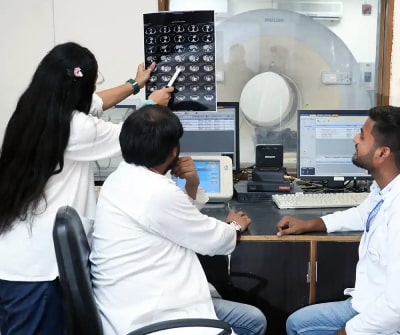
You can get your PFT Test (Pulmonary Function tests) at a Centre Near You - at Ganesh Diagnostic and Imaging Centre
We are spread across in Delhi-NCR in the following locations:
Yamuna Vihar, Mangol Puri, Budh Vihar, Model Town, Hari Nagar, Nangloi
We provide exceptional service and utmost care to our patients and have delivered our service to Lakhs of patients over the many years!
Certified by NABH and NABL Accreditations.
Our latest- technology machines are a standalone testimony of the finest technology at lowest cost and at par with other National and International Standards previously set.
Pulmonary function tests (PFTs) are known to be a group of tests that are responsible to measure how well the lungs would work.
This would also include your breathing and how effectively your lungs would bring oxygen to rest of your body.
The PFTs might be undertaken to determine the following parameters:
Make sure you have a Valid Id Proof and Doctor’s Prescription before undergoing the test.
Each PFT test would perform to assess various factors; hence procedure for each of this test would be different.
No specific after care is required.
Note: Patients with claustrophobia who are undergoing the plethysmography testing might feel anxious, so it’s better to inform the technician beforehand
The Price of PFT tests varies from one diagnostic to another in Delhi.
However, from the averages we see that the - The Pulmonary Function Test (PFT) cost is Rs. 900- Rs. 2000
Check out our website – for Best Quality Service at Lowest rates.
The Normal values of PFTs are seen to vary from one person to another.
In Spirometry: FEV1: It is the Forced expiratory volume measured in one second.
FVC: It is the Forced vital capacity, or full amount of the air that could be exhaled with an effort in the complete breath
Results of amount of air that would be inhaled and exhaled in your test will be compared to average results of people in- same age, height, sex, and race.
The Abnormal PFT results might indicate lung and airway disease, for which even further confirmatory tests would be needed.
To seek Free Consultation from the Doctor:
Contact: Dr. Ravin Sharma, (MBBS, MD in Radiology)
Available: 24*7*365
Phone Number: +91 9212125996
We, at Ganesh Diagnostic and Imaging Center, use MEDICAID Spiro Excel PFT
Machine for Rapid and Accurate Diagnosis of any underlying pathology in your lungs.
So, visit Ganesh Diagnostic and Imaging Center, the Diagnostic Lab Near You at the earliest to ensure good health and maintain your active immune system.
You could contact us on the respective phone number and we would be happy to assist you in the process ahead.
The Spirometry is considered to be a type of lung function test that would measure how much air you could breathe out.
It also helps in measuring how fast you can blow air out. During the test, the technician would ask you to take a deep breath in. Then, you would ask to blow as hard into the tube connected to small machine.
There are certain things that can make the PFTs less accurate.
These include the following:
Before The Test
Most important values of PFT are as follows:
The Spirometry is not able to measure your residual volume or total lung capacity.
The PFTs are used in diagnoses of a lung condition if the patients experience symptoms such as the following:
PFTs might used to diagnose or help in the following:
The Infant PFT is usually a useful tool in being able to identify and manage the high-risk in the pediatric pneumonia patients who might further need a closer monitoring along with follow-up after the hospital discharge, with your referral to the pulmonologist and be required to repeat pulmonary function testing.
Measurements that taken from this test is essential in helping your doctor to diagnose asthma. The Forced Expiratory Volume is the first second (FEV 1) – measures amount of the air you could forcefully blow out in first second of your FVC. In case, this number is lower than what is considered normal, it may mean asthma.
The Spirometry and the PFT testing are known to be a solution for the proactive cardiologist.
Spirometry is considered to be a lung-health specific diagnostic tool; it also plays an important role in assessing your cardiovascular risk, including any coronary artery disease.
Normal findings of Spirometry are considered as your FEV1/FVC ratio, If this value is greater than your 0.70, both FEV1 and FVC above value of 80% of the predicted value.
If the lung volumes are also performed, the TLC above a value of 80% of predictive value is considered normal.
The Diffusion capacity above the value of 75% of predicted value is also considered as normal.
The pulmonary function testing equips your healthcare provider to further diagnose any conditions that could affect the lungs.
The PFTs generally don't take a long time, they aren't also not considered painful and you could also get the results in few days.
PFTS should only be performed to three times to further ensure that your results are reproducible (that is less than the 200ml variation) and also accurate.
The vital capacity (VC) is considered to be maximum volume that is expired after maximum inspiration.
The VC is decreased in any of the restrictive disease but also usually normal in any obstructive disease.
It has been demonstrated that the expert panels could reach up to 77% accuracy when predicting diagnosis based on the PFTs and with the clinical history alone.
The value is considered to be usually abnormal if it is approximately less than 80% of the predicted value.
Any Normal value range might vary slightly among your different laboratories, based on any slightly different ways to determine any normal values.
You could also talk to your healthcare provider about meaning of any specific test results.